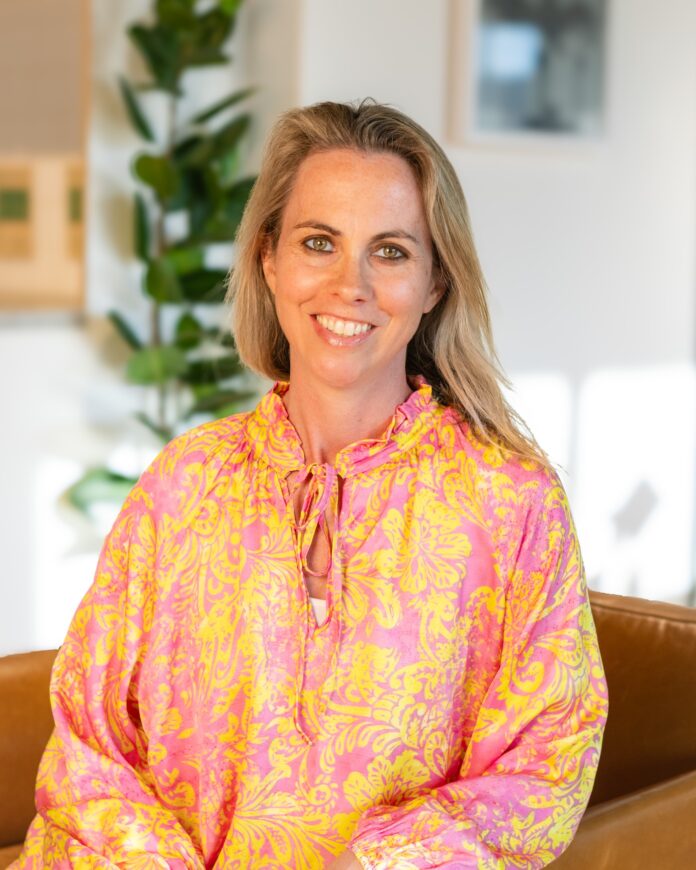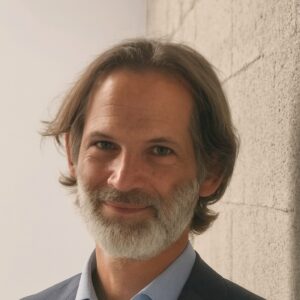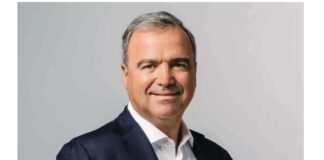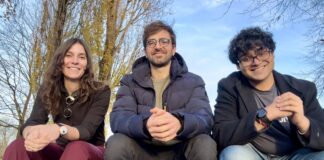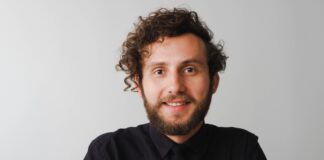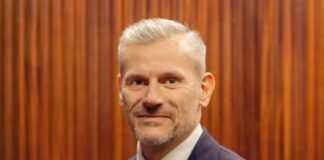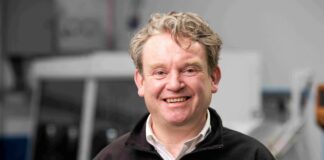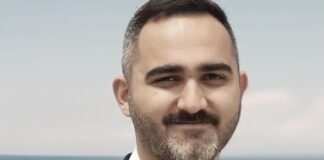Throwing away food means throwing away resources – and, ultimately, a piece of our future. Tessa Clarke understood that from a young age. Growing up on a farm in rural North Yorkshire, she saw first-hand the effort that goes into producing every bite we eat. But the real turning point came years later: newborn in one arm, a box of uneaten food in the other, and no easy way to give it away before moving house. That frustrating moment planted the seed for what would become OLIO – an app that’s now a global force in the fight against food waste. In this interview, Tessa opens up about her journey from corporate life to impact entrepreneurship, the tough lessons she’s learnt along the way, and why inspiring people to share might just be more powerful than preaching about climate change.
Let’s start at the beginning – what sparked your interest in tackling food waste in the first place?
Tessa Clark: I’m a farmer’s daughter from North Yorkshire, England, and so I grew up respecting the hard work that goes into producing the food we all eat every day. As a result of my upbringing I also have a strong connection to the environment, and recognise how crucial it is for humanity to live in equilibrium with nature. That combined with studying social & political sciences at Cambridge University, followed by an MBA at Stanford University probably meant that I was destined to harness the power of business to undertake systems change work in the environmental space – it just took me two decades to figure that out!
Was there a “lightbulb moment”?
Tessa Clark: Absolutely. It happened when I was moving back to the UK after living overseas, and on moving day the removal men told me I had to throw all our uneaten food away. I couldn’t bring myself to do that and so bundled up my newborn baby and toddler and set out onto the streets clutching my food, hoping to find someone to give it to. I failed miserably. So I went back to my apartment and when the removal men weren’t looking, I smuggled the non-perishable food into the bottom of my packing boxes. That was when I realised that there really should be an app to make sharing my food a lot easier than this!
Looking back at your childhood, were there any early influences that shaped your values around sustainability and community?
Tessa Clark: Growing up on a farm instilled in me a deep respect for food, nature, and hard work. My parents were also from the post-war generation, and so with rationing still strong in their minds, I was brought up with a very frugal approach to life and had the words “waste not, want not” frequently ringing in my ears.
You’ve worked in corporate roles before Olio – what made you take the leap into founding your own company?
Tessa Clark: I spent nearly two decades in corporate strategy and general management across retail, media, and financial services – roles that looked great on paper, but that left me uninspired. I spent many years wanting to do something entrepreneurial, but two things stopped me: I didn’t have an “idea”, and I didn’t have the self-belief to get started. Both of those problems were solved when I uncovered the problem of food waste when I was moving country, and when my co-founder Saasha agreed to join me on the crazy entrepreneurial journey. So my advice now for anyone looking to get started is to find a problem you’re passionate about, and find a co-founder to join you on the journey – if you can.
What personal traits or habits do you think have been essential for you as a founder?
Tessa Clark: Perseverance and adaptability have been critical – founders must embrace a test, measure, learn, iterate mindset. I’ve also built a daily structure to support my mental and physical resilience, which involves booking out the first hour of the day for exercise, and ensuring that I get plenty of sleep and eat healthily. That means that when the challenges start to pile up I feel energised to tackle them, not overwhelmed. I’m also deeply motivated by our mission, which means that failure isn’t an option.
Olio has grown into a global movement – how do you keep the original spirit alive as the team and user base expand?
Tessa Clark: Two things have been crucial for this. The first is to ensure that everyone we work with – whether it be employees, partners or investors, are not just ‘mission aligned’ – they’re ‘mission obsessed’. This is a much higher bar, but is crucial to keeping the mission alive. The second thing is to make sure that our company values of ‘inclusive’, ‘caring’, ‘resourceful’, and ‘ambitious’ are used for everything – hiring, performance reviews and operational decision making. If you get those two things right then everything else follows on relatively smoothly.
What were some of the toughest challenges you faced in the early days of Olio – and how did you push through them?
Tessa Clark: One of the hardest challenges was gaining traction with no marketing budget. To help solve that we launched an Ambassador programme, recruiting passionate volunteers to help spread the word, and today, over 50% of our monthly sign ups join us due to word of mouth.
On a personal level, the first year running Olio remotely with a new baby and toddler, whilst having to do consulting work to bring in the money, and no childcare support, was totally unsustainable. So I learned to create structure in my day to keep me sane. Over the years I’ve learned that entrepreneurship is a series of marathons, not a sprint, so resilience is key.
If you could go back to day one of Olio, what would you do differently, knowing what you know now?
Tessa Clark: I’d do two things different, and both require a mindset shift. The first thing I wish I’d realised earlier is that there’s no such thing as a silver bullet. I spent too much time and emotional energy hoping that the next feature, the next hire, the next marketing campaign or the next raise would unlock hockey stick growth. The reality is that growth comes from layering on thousands of lead bullets, day in, day out. The second thing I’d have done differently is to drop my idealism a lot faster. The reality is that whilst people, or companies should do X, Y or Z, the reality is, behaviour change is incredibly hard to unlock, and so it’s much better to meet people where they are. Giving a tangible example of this: we have had to stop talking so much about the climate and environmental impact of food waste, and instead we now focus on what’s in it for you. For individuals it’s about how good it feels to share and support your local community; for businesses it’s all about the business case and so that’s required us to build out additional products so our clients can generate more revenues from their surplus food, before they redistribute it.
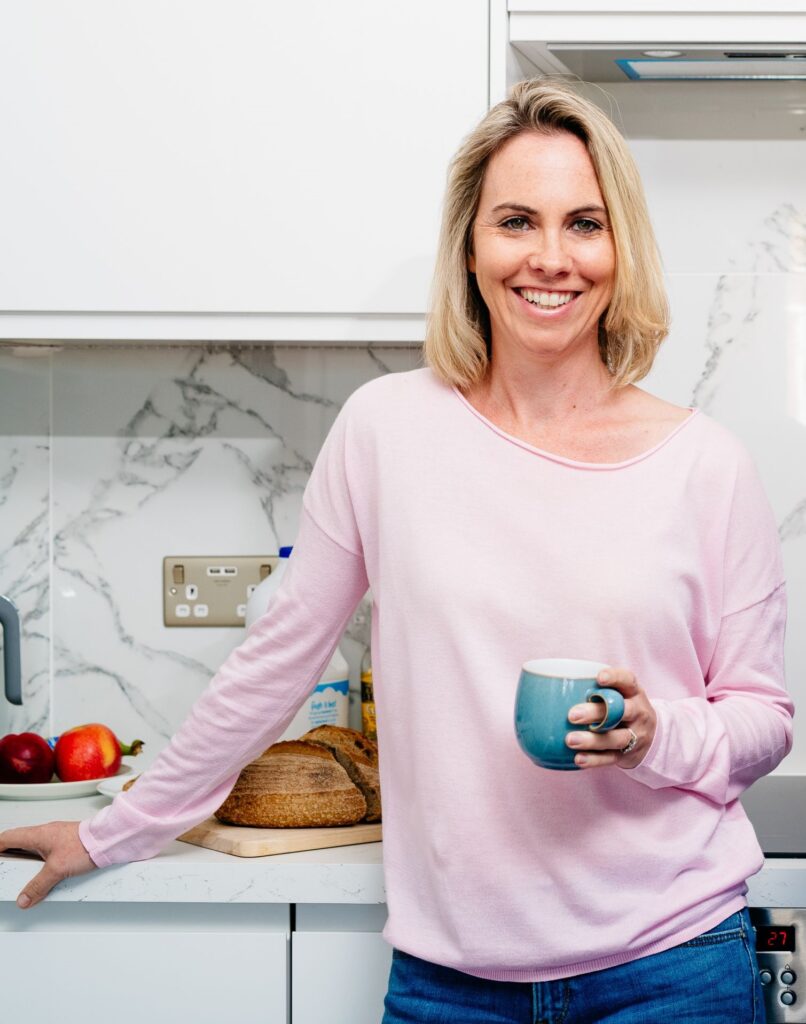
What are some myths or misunderstandings people have about food waste or sharing apps like Olio?
Tessa Clark: A major misconception is that most food waste happens at supermarkets. In reality, in countries like the UK, over half of all food waste happens in the home, while retail accounts for just about 2%. People are shocked when they hear that. The other big misconception is that “no-one will want it”. And that couldn’t be further from the truth: a typical food listing is requested within 30 minutes of being added to the app, and a typical household item is requested within 4-6 hours.
You’re leading a mission-driven team – what’s your approach to hiring and building culture around shared values?
Tessa Clark: From day one, we’ve embedded our four core values – ‘inclusive’, ‘resourceful’, ‘caring’ and ‘ambitious’ – into every hiring process and performance review. These values shape our culture, more than anything, and define who fits well at Olio. We’re also a remote first business, so we probe hard when interviewing to ensure that a remote first approach really is the candidate’s preferred way of working.
What have you learned about yourself through the process of leading a growing company?
Tessa Clark: In common with many founders I’m sure, I’ve learned that I can tend to focus too much on everything we haven’t yet achieved, and so I don’t celebrate the victories easily or often enough. I’ve also had to learn to stop feeling guilty about the fact that Olio is an unashamedly founder-led business, with direct founder involvement in all areas of the business. This doesn’t mean micro-managing, but it does mean we have a laser focused attention to detail and a high quality bar for delivery.
How do you handle tough decisions as a leader – especially when mission and business priorities collide?
Tessa Clark: At Olio we see our mission and financial objectives as being mutually reinforcing, rather than at odds with one another. That’s because we’ve worked hard to create a business model where our revenue – through the service we provide to businesses helping them reduce food waste – supports our impact, and vice versa. We’re unapologetically a for-profit company, and a B Corp, because we believe that profit with purpose is the route to longstanding success. When we have had to take tough decisions – such as restructuring the company for example – I’ve learned that investing time into really explaining the context and history as to how we are where we are, is absolutely crucial for bringing the team along with you. This ensures they understand and buy into the decisions you’ve made, and helps the organisation to ‘bounce back’ much more quickly.
Sustainability is at the heart of Olio – but how do you avoid “green fatigue” or performative eco-talk?
Tessa Clark: First we make sure to use very tangible ‘green’ language. So rather than talking about tonnes of CO2e emissions saved for example, we convert that into how many millions of car miles we’ve taken off the road, which is far more relatable. Second, we make sure to talk about our social impact just as much, if not more, than our environmental impact, because we find that’s what motivates people. For example, people love to know that we’ve facilitated over 50 million doorstep connections, and that 65% of our community has made friends via the app, three-quarters say that sharing has improved their mental health and 84% say it’s improved their financial well-being too.
How do you balance idealism with pragmatism when building a business that’s also trying to save the world?
Tessa Clark: This is something we haven’t been great at to be honest. We saw an enormous – arguably existential – problem facing humanity; we came up with a brilliant solution that works incredibly well, and we expected the whole world would rapidly adopt it. In practice we’ve experienced the the power of existing incentive structures, how the profit motive tends to trump all else, and how tough driving behaviour change can be. Once we figured this out though, we’ve been very pragmatic because we recognise there’s no point in being perfectly idealistic, but also perfectly dead – as that generates no impact at all. So our strategy is to ensure we stay true to our mission and values at all times, whilst doing whatever we can to meet people where they are. Because some impact is ultimately a lot better than no impact.
Beyond food, Olio now supports sharing other items too. Where do you see the future of the circular economy heading?
Tessa Clark: We believe neighbourhoods should become the new marketplace. There are about a billion idle items within a ten-minute walk of your home, and our vision is to unlock access to those by providing a simple, safe and fun way to be connected to your neighbours. Through lending, sharing, and swapping, we’re expanding beyond food into the broader reuse of other household items too.
Where do you personally hope to be in five years – and what’s your vision for Olio by then?
Tessa Clark: We’re celebrating 10 years of Olio this year, and if there’s one thing I’ve learned, it’s how beguiling – but ultimately misleading – 5 year projections are in such an unstable and rapidly changing world! However, as always, we’re working towards a world in which millions of people are connected so the world’s most precious resources can be used and shared, not thrown away. In order to do that we’ve expanded the C2C proposition beyond food sharing to non-food sharing, and in time we’d like to layer on rental too. And on the B2B side of things we continue to move up the waste hierarchy by helping businesses to sell more of their surplus food before they redistribute it; and we’re continuing to explore other parts of the value chain. And of course, we’re actively working to expand the Olio model into international markets, with us having seen organic sharing activity successfully take place in over 60 markets so far.
Do you see Olio as a model for tackling other global challenges, like fashion waste or local resilience?
Tessa Clark: Yes. The core model – connecting local communities through technology, combined with volunteer networks and business partnerships – is absolutely applicable to categories other than just food. And we know we’re providing an enormous increase in local resilience, by optimising waste out of the system. In fact we’ve had a couple of international Governments approach us as they’re looking to increase their country’s food security, and they know that solving food waste can be a very powerful lever in that.
What role do you think tech and innovation will play in building more sustainable communities?
Tessa Clark: Tech is essential: location based services, mobile interfaces, algorithms matching supply and demand – all are core to enabling the optimal utilisation of local resources. We also put a lot of energy into harnessing AI and automations to scale our operations. But just as important are the values and policies with which we manage our community, to ensure that the P2P interaction takes place in a way that’s trusted, friendly and reliable.
What advice would you give to aspiring entrepreneurs who want to solve a big, global problem?
Tessa Clark: Stop looking for big ideas. Start with a real problem you’re obsessed with solving. Test, iterate and learn. Stay mission-focused, and scale wisely.
How do you stay grounded and motivated when the work feels overwhelming?
Tessa Clark: I build structure into my life, and re-energise not just through exercise, sleep and nutrition, but also by looking at the impact we’re having every day on a very human level.
And finally: what’s one thing people can do today – right now – to live more sustainably?
Tessa Clark: Perhaps the simplest thing I’d say is to start with your plate, and don’t waste food. Globally food waste accounts for 10% of all greenhouse gas emissions, and in ‘developed’ countries over half of all food waste takes place in the home. By stopping wasting food you’re having a huge ripple effect – on water, soil, biodiversity, carbon and community. And beyond food, I’d encourage absolutely everybody to have an approach to life which is about sharing more, and wasting less.
Photo/Source: Olio – Annabel Staff


